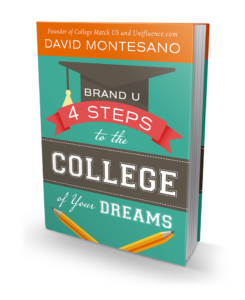The Common App: Everything You Need to Know (Source: USNews)
Applying to college is a tedious and often stressful process for students and their parents. In addition to finishing their last year of high school, teens are also juggling the SAT or ACT, college tours and applications for numerous schools.
The Common Application, which is accepted by more than 750 schools, including some located outside the U.S., helps to streamline one part of the admissions process for students.
When Can I Start Working on My College Application Through the Common App?
The new edition of the Common App opens on Aug. 1 every year. However, students can create an account at any time and transfer their information into the new app when it opens.
To start, applicants can go to commonapp.org and click on the “Get Started” button to get details about how to create an account and log in to work on an application through the platform. Students can download the Common App’s mobile app to keep track of deadlines, invite recommenders and set reminders.
The summer before senior year is a great time for students to start on their applications, experts say.
Students don’t have to submit their applications during the summer. But starting in August gives them the opportunity to review the requirements for schools they’re considering, draft essays and get some of the tedious background information completed before they get bogged down with homework and activities, Warren says.
Starting early also allows students to get the help they need at the beginning of the school year, she says.
How Long Does it Take to Fill Out an Application?
The time it takes to fill out an application will vary based on a school’s requirements, experts say.
The Step-by-Step Guide to Applying to College
- Start the College Application Process
- Complete the FAFSA
- Write a Standout College Essay
- Ask for Recommendation Letters
- Learn the Ins and Outs of Financial Aid
- Decipher College Tuition Costs
- Find Scholarships to Pay for College
In addition to any parental information that’s needed – such as employer details and educational background – many schools also require first-year applicants to submit recommendation letters and transcripts. Students need to give teachers and counselors enough time to submit those materials to the Common App before deadlines.
High school counselors encourage students to ask their teachers for recommendation letters before the end of their junior year so educators can work on them during the summer. Seniors who need recommendation letters should ask for letters early in the school year, experts say.
What Are the Common App Essay Prompts and Where Can I Find Them?
The Common App essay prompts for the 2018-2019 school year will be the same as the seven prompts used this year. Applicants have a 650-word limit for essays.
There is some variation among the topics. A few require students to reflect on their experiences and share examples of learning or personal growth. But students also have the option to share an essay on any topic of their choice or simply describe a topic that captivates them.
With seven options, it doesn’t matter which prompt is chosen, as long as it’s one that allows an applicant to provide insight into his or her identity in ways that aren’t reflected in other parts of the application, experts say.
Not all schools require students to submit an essay. Some institutions may require students to submit additional essays or information. Applicants can see the requirements for all schools on the Common App when they log in to their student accounts or download a PDF from the Common App’s website.
Students can also preview supplemental questions for schools before they start their applications through the platform’s Applicant Solutions Center.
What Should I Do if I Run Into Problems With the Common App?
Students who have questions about filling out the application can ask their high school counselor and the colleges they’re applying to for help, experts say.
The Common App also has a variety of resources to help make the application process easier.
In addition to video tutorials throughout the application, the platform has year-round technical support available 24 hours a day, seven days a week. Students can find answers to frequently asked questions or submit a question in the Applicant Solutions Center. Response times will vary, but the average wait time for a response is 20 minutes, according to Common App representatives.
Can I Get Fee Waivers for the Common App?
The Common App is free to use and about 45 percent of the member schools don’t charge application fees. Students who are applying to colleges that have an application fee will have to pay that cost when submitting their applications.
Applicants who qualify for fee waivers – those who meet the standards set by the National Association for College Admission Counseling – will be able to make that known through the application.
Students who have questions about whether they qualify for fee waivers can reach out to their high school counselors or directly to the colleges that they are applying to, experts say.
What Tips Can Make Filling Out the Common App Easier?
Don’t wait until 11:59 p.m. on Jan. 1 to finish applications, experts say. In 2018, 1,270 students submitted applications during that final minute through the Common App. Schools will still accept applications that are a few minutes late, according to Common App representatives, but the stress that comes with fighting against the clock isn’t worth it.
Besides starting early, experts encourage students to take advantage of the Common App preview that allows students to review their application prior to submission.
Students can also assign advisers who can see parts of an application and the progress they’ve made.
Do I Have to Use the Common App to Apply to College?
Students are not required to use the Common App. While the platform is popular, it isn’t the only one for college applications.
Many schools allow students to apply online through their websites. Some states have application systems that students can or must use in order to apply to schools. For example, Texas has a statewide system for submitting applications, though some Texas schools also accept the Common App.
Some well-known private institutions like the Massachusetts Institute of Technology and Georgetown University in the District of Columbia only accept applications through their school websites. Many competitive colleges and universities, such as Harvard University and Amherst College, accept applications through the Common App.
Other platforms accepted by some schools include the Coalition Application and the Universal College Application. And while there are some exceptions, many schools that use those platforms also use the Common App.
Do Colleges Care if I Use the Common App or a Different Platform?
Colleges that allow students to submit applications through multiple platforms don’t have a preference on which one is used, but high school counselors might. The Common App’s integration with Naviance, a college and career readiness software provider, makes it easy for counselors to submit documentation for colleges, experts say.
But students should submit one application using the platform that works best for them.





 rior to launching College Match in 2001, David worked with noted admissions expert Loren Pope. David has recently discussed an open mindset for college admissions as a panelist with Open Mindset author and Stanford University Professor Carol Dweck.
rior to launching College Match in 2001, David worked with noted admissions expert Loren Pope. David has recently discussed an open mindset for college admissions as a panelist with Open Mindset author and Stanford University Professor Carol Dweck.